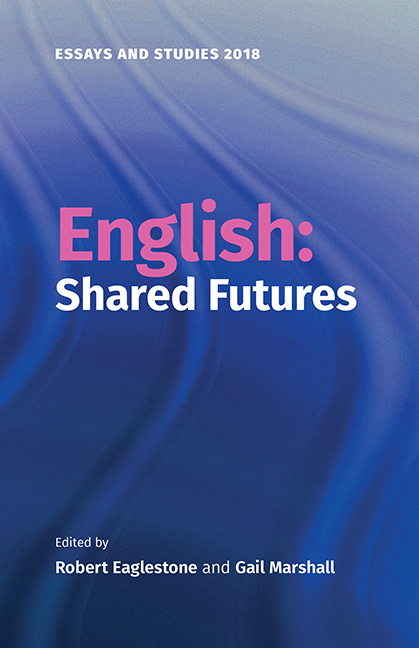Book contents
- Frontmatter
- Contents
- Notes on Contributors
- Acknowledgements
- Abbreviations
- Introduction
- The Changing Picture of School English
- From A-Level to HE: Working Towards a Shared Future?
- English Outreach: Academics in the Classroom
- From Provider to Stager: The Future of Teaching English in HE
- Pedagogic Criticism: An Introduction
- Exquisite Tensions – Narrating the BAME ECA Experience
- Postgraduate Futures: Voices and Views
- Shared Futures: Early Career Academics in English Studies
- Some Reflections on the Funding of English Departments
- English: The Future of Publishing
- Digital Futures
- A View from the United States: The Crisis in the Humanities; the Liberal Arts; and English in the Military Academy
- The Future of Borders
- ‘Between and Across Languages’: Writing in Scotland and Wales
- Exploring Intersections between Creative and Critical Writing: An Interview with Elleke Boehmer
- Integrating English
- Employability in English Studies
- Creative Living: How Creative Writing Courses Help to Prepare for Life-long Careers
- Practice at Large: How Creative Writing can Enhance University Research Environments
- ‘And who can turn away?’ Witnessing a Shared Dystopia
- English and the Public Good
- ‘Can Wisdom be put in a silver rod? / Or Love in a golden bowl?’ On Not Defending the Humanities
- ‘Something Real to Carry Home When Day Is Done’: The Reader in Future
- Afterword
- Index
Digital Futures
Published online by Cambridge University Press: 15 October 2019
- Frontmatter
- Contents
- Notes on Contributors
- Acknowledgements
- Abbreviations
- Introduction
- The Changing Picture of School English
- From A-Level to HE: Working Towards a Shared Future?
- English Outreach: Academics in the Classroom
- From Provider to Stager: The Future of Teaching English in HE
- Pedagogic Criticism: An Introduction
- Exquisite Tensions – Narrating the BAME ECA Experience
- Postgraduate Futures: Voices and Views
- Shared Futures: Early Career Academics in English Studies
- Some Reflections on the Funding of English Departments
- English: The Future of Publishing
- Digital Futures
- A View from the United States: The Crisis in the Humanities; the Liberal Arts; and English in the Military Academy
- The Future of Borders
- ‘Between and Across Languages’: Writing in Scotland and Wales
- Exploring Intersections between Creative and Critical Writing: An Interview with Elleke Boehmer
- Integrating English
- Employability in English Studies
- Creative Living: How Creative Writing Courses Help to Prepare for Life-long Careers
- Practice at Large: How Creative Writing can Enhance University Research Environments
- ‘And who can turn away?’ Witnessing a Shared Dystopia
- English and the Public Good
- ‘Can Wisdom be put in a silver rod? / Or Love in a golden bowl?’ On Not Defending the Humanities
- ‘Something Real to Carry Home When Day Is Done’: The Reader in Future
- Afterword
- Index
Summary
A casual observer on any university or college campus watching undergraduates on English courses heading into their classrooms may well conclude that the digital future is already with us. These students are now less likely to be arriving with bundles of books under their arms and much more likely to be carrying a lightweight laptop or tablet. They will not merely be word-processing assessment tasks for their coursework or reading texts online, but diving into digital databases and archives, and taking part in virtual discussions with other students. Although as an academic discipline English is still strongly identified with terms, concepts and formats from the era of print, it is increasingly infused with the potentialities of digital technology and digital culture. If, as seems likely for the foreseeable future, both technologies continue to co-exist, how will this influence our teaching, research and scholarship?
Some aspects of English's digital future provide researchers and students with opportunities to extend and develop established academic enquiries, using the power of digital technology to do things differently and at scale. Other aspects tap into the way that the digital culture of the twenty-first century is changing the way we read, write and interact with each other; these still-fluid developments include the impact of contemporary higher education's technology-rich environments on pedagogy. In some areas, continuities overlap with new developments, most markedly in English Language Studies. Perhaps the most obvious example is corpus linguistics, whose development runs in tandem with the increasing sophistication and decreasing size of mainframe computers. In the 1960s Brown University created the million-word Standard Corpus of Every-day American English, and this has been followed by both increasingly larger corpora and smaller, more specialized, corpora. Such digitized collections allow investigations of language features across corpora designed to represent particular genres or to represent, as far as possible, the language as a whole. Specialized corpora relating to a particular writer, text-type or genre allow easy searching, comparison and, where relevant, quantification. Corpora based on geographical or historical sources support investigation of English in particular places, at particular periods and through change over time. In relation to contemporary English, Ronald Carter and Michael McCarthy's work on spoken and written corpora has enhanced our understanding of the difference in the rules of grammar that differentiate the two.
- Type
- Chapter
- Information
- English: Shared Futures , pp. 100 - 108Publisher: Boydell & BrewerPrint publication year: 2018

